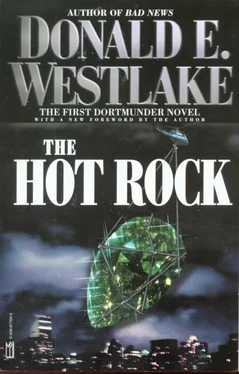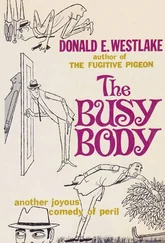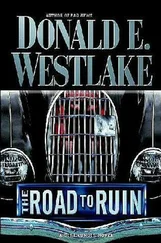Dortmunder snatched the box from his hand, stepped back, opened it and took a quick look inside. The emerald was there. He looked up, and the Major was jumping at him. The Major jumped into the barrel of the gun, and fell backward dazed.
The door opened, and one of the black men started in. Dortmunder hit him in the stomach, remembering that they'd just eaten, and the black man said, "Phooff!" and bent over.
But the other black man was behind him, and the third wouldn't be far away. Dortmunder turned, emerald in one hand and revolver in the other, and raced away down the stairs.
He heard them following him, heard the Major shouting. The first door he came to was locked, and the second one led him outside into the chill darkness of an October evening.
But outside where? Dortmunder stumbled through darkness, rounded a corner, and the night was full of airplanes.
He had gone through the looking glass, past that invisible barrier that closes half the world to unauthorized personnel. He was back where the planes are, in pockets of bright light, surrounded by darkness punctuated by strips of blue lights or amber lights, taxiways, runways, loading zones.
And the black men were still after him. Dortmunder looked to his right, and passengers were disembarking from an SAS plane over there. Join them? Except that he would look a little strange at customs, with no passport, no ticket, no luggage. He turned the other way and there was darkness, and he ran into it.
The next fifteen minutes were hectic ones for Dortmunder. He kept running, and the three black men kept running in his wake. He was all over the territory reserved for airplanes, running now on grass, now on a taxiway, now on gravel, jumping over marker lights, trying not to silhouette himself too clearly against the brightly lit areas and also trying not to get himself run down by a passing 707.
From time to time he saw the civilian part of the airport, his part, the other side of a fence, or around the corner of a building, with people walking and taxis driving along, but every time he headed that way the black men angled to head him off and keep him in the flat open exposed area.
And now he was getting farther and farther away from buildings, bright lights, all connection with the passengers' part of the terminal. The runways were dead ahead, with the long lines of planes waiting their turns to take off. An Olympia jet would take off, followed by a Mohawk twin-engine prop plane, followed by a pop singer's Lear jet, followed by an ancient two-seater Ercoupe, followed by a Lufthansa 707, the monsters and the midgets one after another, obediently taking their turns, the big guys never shouldering the little guys out of the way, that being done for them in the control tower.
One of the planes waiting to take off was a Waco Vela, an Italian-built, American-assembled single-engine five-seater with an American-made Franklin engine. At the controls was a computer salesman named Firgus, with his friend Bullock asleep across the back seat. Ahead of him was a TWA jet, which trundled into place at the head of the runway, roared and vibrated a few seconds, and then began galumphing away like Sidney Greenstreet playing basketball. Till it became airborne, at which point it also became graceful and beautiful.
Firgus drove his little plane forward, out onto the runway, and turned right. Now the runway stretched ahead of him. Firgus sat there looking at his controls, waiting for the tower to give him the go-ahead, and regretting the chop suey he'd had for dinner, and all at once the right-hand door opened and a man with a gun got in.
Firgus stared at him in astonishment. "Havana?" he said.
"Just up in the sky will do," Dortmunder told him and looked out the side window at the three black men running his way.
"Okay, N733W," the tower said in Firgus's earphones. "Cleared for takeoff."
"Uh," said Firgus.
Dortmunder looked at him. "Don't do anything stupid," he said. "Just take off."
"Yes," Firgus said. Luckily he was an old hand with this plane and could fly it while his mind was doing flip-flops. He set the Vela going, they skeetered away down the runway, the black men came to a panting stop way back there, and the Vela climbed abruptly into the air.
"Good," Dortmunder said.
Firgus looked at him. "If you shoot me," he said, "we'll crash and you'll die too."
"I won't shoot anybody," Dortmunder said.
"But we can't make it to Cuba," Firgus said. "With the gas I've got, we wouldn't make it much past Washington."
"I don't want to go to Cuba," Dortmunder said. "I don't want to go to Washington either."
"Then where do you want to go? Not over the ocean, that's even longer."
"Where were you going?"
Firgus couldn't figure any of this out. "Well," he said, "Pittsburgh, actually."
"Head that way," Dortmunder said.
"You want to go to Pittsburgh?"
"Just do what you were going to do," Dortmunder said. "Don't mind me."
"Well," Firgus said. "All right."
Dortmunder looked at the sleeping man in back, then out the window at the lights going by in the darkness below. They were away from the airport already. The Balabomo Emerald was in Dortmunder's jacket pocket. Things were more or less under control.
It took fifteen minutes to fly over New York and reach New Jersey, and Firgus was silent all that time. But he seemed to relax a little more when they were over the darker, quieter New Jersey swamp, and he said, "Boy, I don't know what your problem is, but you sure scared the dickens out of me."
"Sorry," Dortmunder said. "I was in a hurry."
"I guess you must have been." Firgus glanced around at Bullock, who was still asleep. "Does he have a surprise coining," he said.
But Bullock kept on sleeping, and another quarter hour went by, and then Dortmunder said, "What's that down there?"
"What's what?"
"That sort of pale strip."
Firgus looked down and said, "Oh, that's Route Eighty. You know, one of the new superhighways they're building. That part isn't done yet. And they're obsolete, you know. This is the coming thing, the small private plane. Why, do you know-"
"It looks done," Dortmunder said.
"What?"
"That road down there. It looks done."
"Well, it isn't open yet." Firgus was irritated. He wanted to tell Dortmunder the wonderful statistics of private plane ownership in the United States.
"Land there," Dortmunder said.
Firgus stared at him. "Do what?"
"It's wide enough for a plane like this," Dortmunder said. "Land there."
"Why?"
"So I can get out. Don't worry, I'm still not going to shoot you."
Firgus banked the plane and circled back over the pale strip on the dark ground below. "I don't know," he said dubiously. "There's no lights or anything."
"You can do it," Dortmunder told him. "You're a good pilot, I can tell you are." He didn't know anything about flying at all.
Firgus preened. "Well, I suppose I could bring her in down there," he said. "Be a little tricky, but not impossible."
"Good."
Firgus circled twice more before making the attempt. He was clearly nervous, and his nervousness communicated itself to Dortmunder, who almost told him to fly on, they'd find someplace better farther on. But there wouldn't be anyplace better. Dortmunder couldn't have Firgus land at a regular airport anywhere, so it had to be something irregular, and at least that was a straight ribbon of concrete down there, and wide enough to land the plane on.
Which Firgus did, very well, once he'd built his nerve up to it. He landed as light as a feather, brought the Vela to a stop in seven hundred feet, and turned a huge smile at Dortmunder. "That's what I call flying," he said.
"Me too," Dortmunder said.
Firgus looked at Bullock again and said testily, "I wish to hell he'd wake up." He poked Bullock's shoulder. "Wake up!"
Читать дальше












